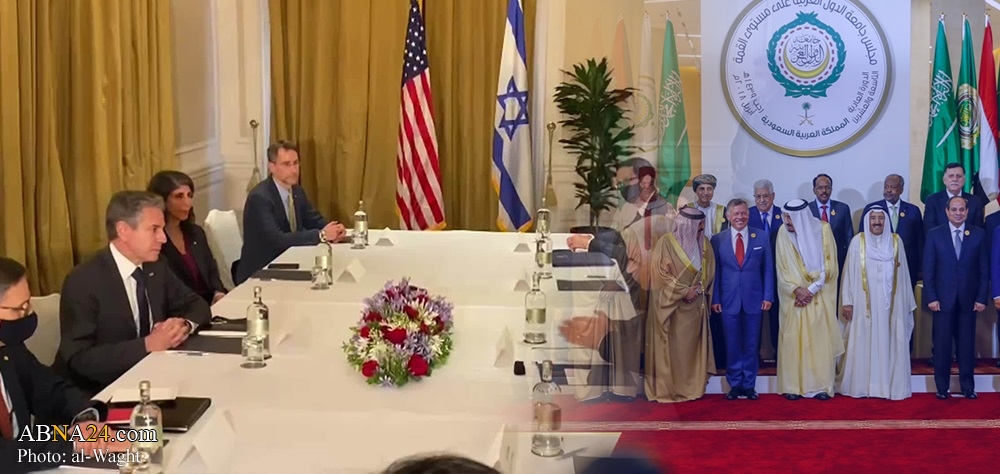AhlulBayt News Agency (ABNA): Senior officials from more than 60 countries of the US-led anti-ISIS coalition gathered in Rome on Monday, with the American Secretary of State Antony Blinken chairing the meeting. It was the first ministerial meeting of Blinken since Joe Biden assumed the power in the US.
The US media reported that the main topic of the conference was tackling terrorism, topped by ISIS, in Africa. It also discussed providing humanitarian aids and extending the aid delivery mechanism in Syria. However, the reality is that the goals of the conference go beyond the declared ones.
The eye-catching point here is the invitation of the Arab League to a meeting that also discusses Syria. In fact, the US surprisingly added to the invitation list the Arab bloc. The meeting started with Blinken hosting his G7, Qatari, Turkish, and EU counterparts. However all of a sudden, Ireland and Arab League were invited. Ireland was invited because it, along with Norway, is responsible for the UN humanitarian affairs. But the invitation of the Arab League is a point of question.
The invitation of the Arab League beside other states leads to the conclusion that Washington has goals transcending those stated. First, by inviting the Arab League, the Americans intended to take control of the process and possibilities raised for the normalization of relations between the Arabs and the government of Bashar al-Assad in Syria, or to prevent implementation of this process. Second, the Americans intend to extend the Security Council resolution on aids to the Western-backed terrorist militias in northern Syria.
Blocking Arab-Damascus rapprochement
Invitation of the Arab League comes as recently Russian Foreign Minister Sergey Lavrov in his Arab tour and meetings with officials raised the interest of some Arab states to normalize ties with the Syrian government and allow Damascus to return to the Arab League. At regional levels, there is an abundance of signals demonstrating the Arab countries' will to advance a de-escalation process with Syria.
This was observable from the recent contacts and meetings between Saudi and Syrian officials. Syrian Tourism Minister Mohammed Rami Martini visited Saudi Arabia to attend a West Asian tourism conference held on May 26-27. This was the first visit of a Syrian official in 10 years, specifically since eruption of the Syrian crisis in 2011. For many, the visit symbolized start of a de-escalation process between the Arab countries and the Syrian government.
In fact, after several years of maximum tensions of the Arab League and the (Persian) Gulf Cooperation Council with the Syrian government, the Arab world now seems to have reconsidered its strategy against Bashar al-Assad amid failure of the policy of maximum opposition. The Arab rulers know that the Syrian government has moved out of the crisis, and the issue of the collapse of the government and the ouster of President Assad from power has become inapplicable. Therefore, in the new situation, there is no way for the Arab states but de-escalation and re-establishment of cooperation with President Assad's government.
In such an atmosphere, by inviting the Arab League, the government of Biden seeks to block a possible rapprochement process. Washington strategists know that such a process will disrupt the Arab-Israeli normalization process that is in its early stages.
Extending aids delivery to the areas controlled by armed groups
Another issue pursed by the Americans through the conference was extension of a 2014 UN resolution that backed delivery of aids to the militia-held areas of Syria. The aids have since been delivered to the armed groups without permission from the Syrian government. Now the US, Turkey, and European powers push to renew the resolution to continue their assistance to the anti-Damascus groups through border crossings. But Syria allies, specifically China and Russia as permanent Security Council members, are opposed to this aid delivery and insist that humanitarian help should go via the central government, otherwise it would be a violation of the Syrian sovereignty.
By Rome meeting, the Americans intended to renew the resolution that is extremely difficult. Earlier, Washington tried to persuade Moscow for support to the resolution extension. Not imposing new sanctions on Syria based on Caesar sanctions in the first six months of Biden presidency, approving exceptions from sanctions to Syria in medical services sector, and agreeing to delivery of aids through the "de-escalation zones were examples of leniency aimed at winning Russian green light. But, Washington is yet to be informed of stance of Moscow which asserts that decisions on this case will be made at highest levels, namely by President Vladimir Putin, and signs suggest Moscow will oppose an extension.
Moscow opposed to Rome conference
Evidence shows that Moscow by no means was in favor of the Washington-facilitated meeting in Rome, and plans, in a countermeasure, to invite the Astana peace initiative members, Iran and Turkey, next month as the resolution is to expire on July 11. Russians, in fact, believe that the Western countries and their leader the US have no real will to solve the Syrian crisis and essentially take advantage of the ongoing conflict in the Arab country.
As the Russian Foreign Minister Sergey Lavrov insists, as long as a comprehensive deal that covers the Caesar Act is not approved and enforced, there is no road to stability in Syria. In fact, any initiative by the West only works to waste time and keep its military presence in Syria. Meanwhile, such issues as the failure to rebuild Syria's infrastructures and facilitate refugees return, as well as the American military presence specifically in Eastern Euphrates, present the biggest threats to the Syrian future. Therefore, Moscow's fear of the mean American goals in Syria rests on the field realities.
/129

